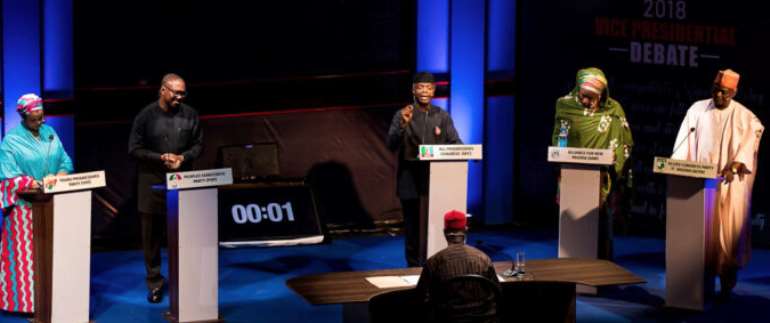Why Debates And Town Hall Meetings Matter During Electioneering

There is no denying the fact that if the culture of debate has been well entrenched in Nigeria’s ongoing democratic system of government, and popularly accepted by political aspirants that it would have by now been playing a crucial role in Nigeria’s democracy by shaping the perceptions of the electorates about the candidates they chose to vote for ahead of crucial elections. The reason for the foregoing cannot be farfetched as it would have engendered a political atmosphere that gives the electorates across constituencies the chance of seeing the character, temperament, and unscripted approaches of political aspirants, particularly at this time where 18 political aspirants representing various parties registered by the Independent National Electoral Commission (INEC) are set to participate in the 2023 general and presidential elections.
Not only that, the electorates would have by now that electioneering is ongoing been receiving undiluted information from the aspirants as they would through the channel of debate on televisions or town hall meetings be informing them on how they intend to take decisions when elected. Such information would have no doubt put the electorates on an informative pedestal as it is part of a thriving democracy. The situation would have by now eliminated an unruly situation where not a few campaign managers are seen literarily running head over heels in the bid to outdo one another as they churn out a plethora of information they want their “paymasters” to hear.
Thus, people are not getting the right information, and worse still, it is difficult to make an informed decision on whom to vote for as it is hard to know what information to trust. For instance, when Bola Ahmed Tinubu, popularly known as BAT and Jagaban, made a gaffe during his campaign where he unarguably uttered gibberish which not a few political observers are still trying to figure out what he meant by the words that sound as follows, “Balabloo-blu-Bulava”, some of his campaign spokesmen said he deliberately pronounced the words at such to create a jocular effect while other spokesmen of his were unanimous in their defense that anyone can make a gaffe, and that no one is above misspeak. The beauty of debate is that if the question was directly put to him at a given town hall session, he would have on his own answered the question without telling lies like his spokesmen. This makes a live debate a trusted source of information because it is one of the very few times during an election campaign that one can hear directly from political aspirants, unedited and unfiltered.
With a live debate on any given national television, the electorates will no doubt be in advantageous positions of viewing leaders together in one place, live on stage, answering questions, and challenging each other’s ideas and opinions. This will no doubt help the electorates make their own decision about the issues that matter to them. It is also an opportunity to learn about issues that matter to other Nigerians and be exposed to views that are different from their own, and those around them. It is indeed a window into the world of others.
For the sake of clarity, a debate is something we can participate in together. It would be easy to see the things that separate us as Nigerians; we are spread apart across a huge land mass; we live in different places; we speak different languages, we come from different backgrounds and yes, we care about different things. But this is an opportunity for the country to come together: to watch or listen to the same thing, at the same time, to gain an understanding of the issues at hand, and what they mean to people across the country. In fact, it is a chance to learn about each other, and the people who want to lead our country.
Given the political gains that are inherent in debates among political aspirants, particularly during electioneering, it is expedient to ask, “Who is afraid of engaging in political debates with other aspirants?
The foregoing question is apt, particularly as it is no more news to say that political aspirants in the ongoing electioneering are averse to national debate or town hall meetings, and have on that apathetic note left millions of Nigerians in a state of perplexity. The reason for this cannot be farfetched as many of them, including this writer, least expected that the aspirants and their campaign teams will behave in such undemocratic manners given what they stand to gain from participating in public debate ahead of the 2023 elections.
It is expedient at this juncture to say it is absurd for any politician to be finding excuses to give for running away from a national debate that no doubt has a diverse advantages; to the electorates, the umpire which is INEC and the aspirants, and his party. In fact, countries in all regions of the globe are increasingly trying to integrate candidate debates into their electoral processes. To date, debates have been staged in several nations and regions. Behind this global trend is the conviction that debates benefit traditional and emerging democracies in many ways. These include helping voters make informed choices; focusing candidates on policy issues rather than personality, religion, or ethnic loyalties; reducing the potential for violence in countries emerging from conflict and holding elected officials to their campaign promises.
Though, debates in some countries have failed when sponsors could not surmount challenges, including allaying fears that organizers may have a political bias, convincing reluctant candidates to participate, negotiating with rival media outlets to show a common debate broadcast, and successfully producing live national television and radio programs, among other issues. The foregoing drawbacks should not draw Nigeria back from what has been democratically tested in various parts of the world to be beneficial.
